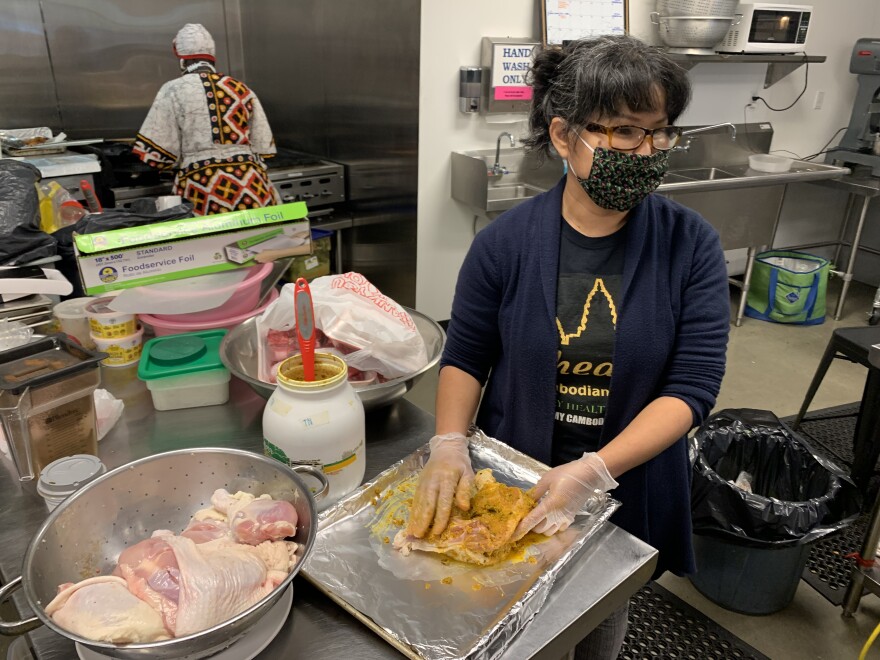This is home to Spice Bridge Global Food Hall, a year-old incubator for food businesses. It has a commercial kitchen with four cooking stations, four food retail stalls and a large community dining area.
But best of all, Spice Bridge has people from across the neighborhood and across the world sharing their food and their culture with any who come to buy.
This two-year program for budding entrepreneurs is part of Global to Local and managed by the Food Innovation Network, supporting women of color and immigrants who want to start food businesses.
FAMOUS RICE
Adama Jammeh and her sister, Oumie Sallah, run Afella Jollof Catering. When we visit, Jammeh is preparing goat dibi. This is Senegambian food.
“It’s a street food in the Gambia and Senegal, and it’s going to be served with our famous Jolloff rice,” she said. “[The rice] is a dish that’s present at all events — weddings, funerals, christenings.”

And it smells rich and savory, as spices and the cooking meat combine to create an enticing aroma.
The sisters want to introduce more people to Senegambian cooking — and to make a living at it. They cooked for friends and neighbors but hadn’t thought about starting a business.
“Until one of our nieces said, ‘You cook way too good to just stay in here,’ ” Jammeh said.
With that nudge, and some help from the Food Innovation Network, they found Spice Bridge.

“We were able to obtain a business license … all those processes that were overwhelming and making us scared to go out there and do it on our own, were made easy and possible through them,” she said. “And here we are now, feeling like celebrating.”
A big part of why Spice Bridge works is that it provides a community of peers.
This food court has eight food businesses that rotate through the four stalls. Each has different cuisines and goals, but they all learn from and support one another. It’s mostly women. And while Jammeh and Sallah might be the only set of actual sisters, the women who cook here call their group a sisterhood.
'YOU'LL FIND ME'
Not far from the stove where Jammeh is making goat dibi is a big stainless steel table where Theary Ngeth is preparing some chicken.
She’s made a bright orange paste of turmeric, garlic, lemongrass, makrut lime leaves and galangal.
“We use a lot of lemongrass to differentiate us from our neighbor countries,” Ngeth said. “We paste our lemongrass and herbs and roots all together. That’s our signature.”
That requires mashing the ingredients with a mortar and pestle, a painstaking process when compared to using a blender or food processor.
“I sometimes wonder why my ancestors like it this way,” she said, feigning irritation. “A lot of Cambodians ask if you paste it or if you use a blender. If you use a blender, they feel like it’s not the core of our ingredients. You have to paste it. That’s where they feel you get all the flavor and the aroma.”

Ngeth came to the United States as a teen and learned to cook from her mother. At first she wasn’t interested, but now she sees it as a way to keep Cambodian culture present. A lot of it was lost during a horrific chapter in Cambodian history, when the Khmer Rouge ruled the country in the late 1970s, killing nearly 2 million people.
“A lot of the people who know our cultural food, a lot of them were eliminated,” she said. “That took a lot of our Cambodian spirit.”
One in four Cambodians was murdered during the rule of the Khmer Rouge.
Today, Cambodian food is underrepresented among Asian cuisines. Here in western Washington, you’ll find many Thai, Vietnamese, Japanese, Korean and Chinese restaurants, but it’s harder to locate food from Cambodia.

“Until I came along,” Ngeth said. “Now, if you Google ‘Cambodian food,’ you’ll find me.”
This chicken, though still raw, is looking better and better as Ngeth works the paste into small cuts she’s made, and underneath the skin of the bird.
She jokes that she talks to her food as she makes it, urging it to be “gorgeous and delicious.”
She puts it in the oven to slowly cook. When it emerges, the skin is crispy and brown and the meat tender, juicy and aromatic. It is both gorgeous and delicious.
SO MUCH TO SHARE
Like Theary Cambodian Foods, the sisters Adama Jammeh and Oumie Sallah say they, too, are a rare business in our region — the first Senegambian food-making business in King County, by their own estimation.
“We’re very proud to be adding that country name into the Seattle area, because we’ve never had a concept like this,” Jammeh said. “This food makes me proud.”
Make no mistake: Like any food business, this is hard work. But there’s joy here, too. You can see it when two cooks from different businesses joke with each other over whose culture has rights to a particular cuisine, or when one comes in with a basket full of peppers from the nearby farmers market, or when a customer buys some food, sits down at a table across the way, and their eyes expand as they taste flavors they’ve maybe never experienced before.
At Afella Jollof Catering, they sell two different drinks, one bright yellow and full of fresh ginger, and the other a deep red, flavored by hibiscus.
Jammeh recalls giving some students a sample of each.
“They were like, ‘This stuff is so frickin’ good that you can’t even choose!’” she says, as peals of laughter ring out in the kitchen.
It’s as accurate a review as any.










